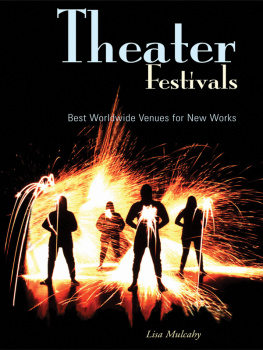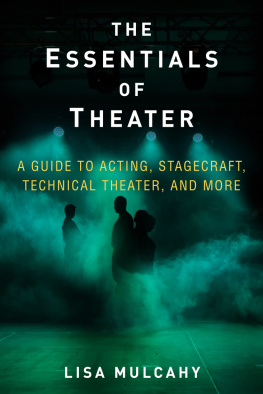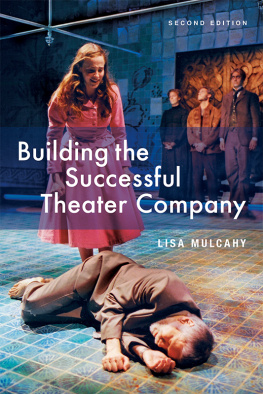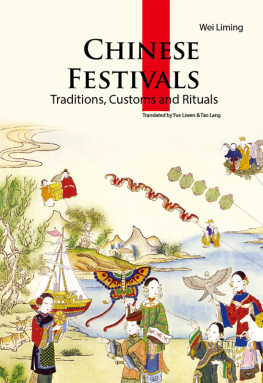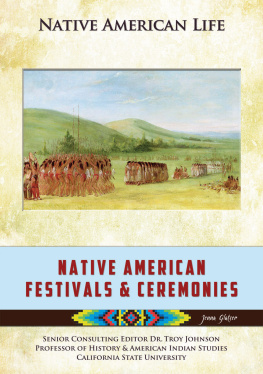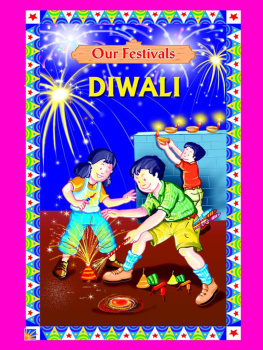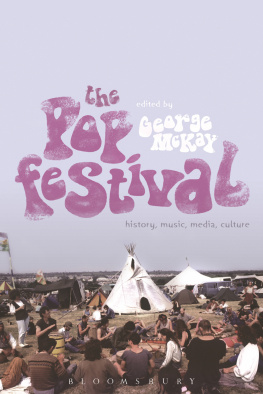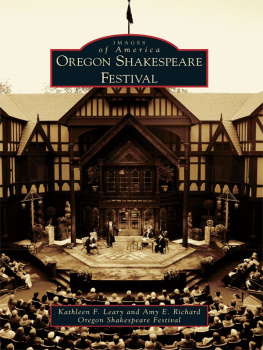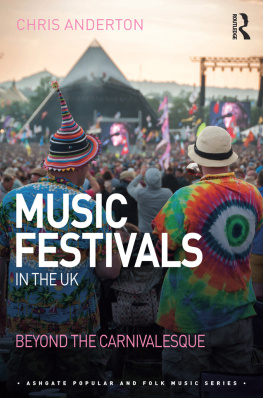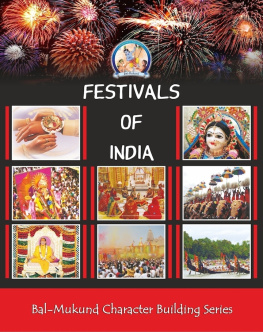Theater
Festivals
Best Worldwide Venues for New Works
Lisa Mulcahy

2005 Lisa Mulcahy
All rights reserved. Copyright under Berne Copyright Convention, Universal Copyright Convention, and Pan-American Copyright Convention. No part of this book may be reproduced, stored in a retrieval system, or transmitted in any form, or by any means, electronic, mechanical, photocopying, recording, or otherwise, without prior permission of the publisher.
08 07 06 05 04 5 4 3 2 1
Published by Allworth Press
An imprint of Allworth Communications, Inc.
10 East 23rd Street, New York, NY 10010
Cover design by Derek Bacchus
Interior design by
Page composition/typography by
Cover Photo Credit: LUMA, See You in the Dark (www.lumatheatre.com)
ISBN:1-58115-402-X
Library of Congress Cataloging-in-Publication Data
Mulcahy, Lisa.
Theater festivals: best worldwide venues for new works/Lisa Mulcahy.
p. cm.
Includes index.
ISBN 1-58115-402-X (pbk.)
1. Drama festivals. 2. Performing arts festivals. I. Title.
PN3156.M86 2005
792.079dc22
2004029551
Printed in Canada
For my father, William Mulcahy 
Acknowledgments
Id like to express my heartfelt thanks to the following people who helped me immeasurably during the genesis of this book:
As always, I salute my guiding forces at Allworth Press, Tad Crawford and Nicole Potter-Talling, for their belief in my work, incredible input, and invaluable support. Id also like to commend the crackerjack Allworth staff as a whole, who all are a pleasure to work with, and give a special mention to Michael Madole, whose positive professionalism is simply terrific, and Jessica Rozler, for all of her terrific contributions.
My deepest appreciation goes out to the festival artists and industry leaders who graciously and generously share their insights and expertise within these pages: Melody Brooks, Shannan Calcutt, Leah Cooper, Zan Sawyer Dailey, TJ Dawe, Bob Dolan, Charles Fee, David Fuller, Kristen Gandrow, Christopher Lee Gibson, Patrick Goddard, Steven Gove, Matt Grabowski, Paul Gudgin, Stella Hall, Ed Herendeen, Kim Peter Kovac, Fergus Linehan, Jenny Magnus, Joseph Melillo, Thomas Morrissey, Janet Munsil, Trey Nichols, Nigel Redden, Charlie Ross, Mark Scharf, Kirsten Schrader, Kate Snodgrass, Nick Stucchio, Jason R. Teeter, Jon Tuttle, Daniella Topol, Susan Woolverton, and Sue Zizza.
My gratitude also goes out to the following festival personnel who aided me greatly in working out the logistics of numerous interviews: Graeme Farrow, Marie Jacinto Lawson, Shoshana Polanco, Martin Reynolds, Kyle Shepherd, Wanda Snyder, Marie Storey, and David Wanger. Extra-special thanks for extra-special assistance goes to Elena Holy, Owen OLeary, Beth Marshall, and again, Martin Reynolds; plus Angela Pfenninger for providing me with supplementary materials.
A very special mention to the lovely Vivion Stinson, Shannel Stinson-Davis, Sally Dickinson, Noelle Dickinson, Helen Kenny, and Virginia Farillas. Your grace, generosity, and kindness is an inspiration to me and everyone lucky enough to know you.
I would like to give special thanks as well to Bob Dolan and Lynn Marie Macy.
I would like to give very, very special thanks to Donna L. Fougere, Publishing Specialist, without whose help this project would not be possible.
For her technical wizardry, I thank Johanne Cimon of The Most Office in Fitchburg, Massachusetts; her work is, as always, fantastic. Special kudos also go out to my aunt, Sr. Joan Mulcahy, for communications assistance, and to my cousin, Sandy Falk, for providing the books mascot.
I thank my entire family, the extended Mulcahy and Kelly clans, for their never-ending love and support. To my posse of friends, thanks for always being there. I send out gratitude and best wishes to the Brandeis University community, my dear friends and colleagues on the New York City theater scene, and to my past mentors Ted Kazanoff and Edward Albee.
Most of all, I thank my beloved mom, Joan Mulcahy, who means the world to me.
LISA MULCAHY
Contents
INTRODUCTION
The need to be seen and heard: Thats the motivation that drives virtually every theater artist.
Youd think that when youre dealing with an entity as important as art, the world would be hanging on every quality playmakers word, but sadly, we know this just isnt the case. You could blame this on the fact that our culture seems to want nothing more visionary or intelligent out of its entertainment than watching Playboy Playmates eat giant bugs on Fear Factor, but thats not the whole problem. Really, the issue is lack of opportunity: Where is the work of a smart, risk-taking writer, performer, or director really welcome these days?
As commercial theaters sensibility becomes more conservativethere are more revivals and Disney-fied musicals in New York these days than you can shake a stick attheres less and less room for the kind of trailblazing stuff that pushes the art form to a new level. Thats not to say a lot of those revivals and Disney-fied productions arent worthwhilethey fill seats, introduce new generations to the theater, and actually can be pretty good. Still, we always need a safe haven for daring material. And thats getting harder and harder to find, as more and more regional companies also turn a blind eye to the original, for the sake of placating their subscriber bases.
Alls far from lost, however: The world of new works festivals offers an invaluable oasis for both artists and receptive audiences. Working at a theater festival, in the best-case scenario, can allow you to maintain total control over your material (even allowing you the option of developing or reworking it on its feet as part of the performance process). It can provide you with a huge swell of patrons wholl have definite reactions, either positive or negative, to your work, and wont be the least bit shy about letting you know what they think. It can allow you the rare luxury of unlimited networking (with producers or scouts who might want to option your show, or talented fellow artists with whom you could fruitfully collaborate). It can give you the chance to actually make some cash doing what you love most. And those whove done it will attest that its quite a blast to boot.
This books intent is to immerse you in the world of theater festivals of new work, to give you an inside glimpse at how the fest scene operates, and to show you how to make it work for you. In a nutshell, what you hold in your hands is the theater pros bible for navigating this world and coming out unscathed on the other side. Because despite the riches of potential payoffs, there are dangers lurking on the festival scene: artistic dangers, financial dangers, critical reception dangers, even physical dangers. Not to sound like your mom, but you gotta be careful when talking to strangers, especially at that solo performance festival youve somehow gotten stranded at in a muddy cow pasture in Scotland, with nothing left to your name except one measly Euro and the last three bites of a stale Toblerone bar. The first rule of the festival world: Prepare and plan before you dip a single toe in.

